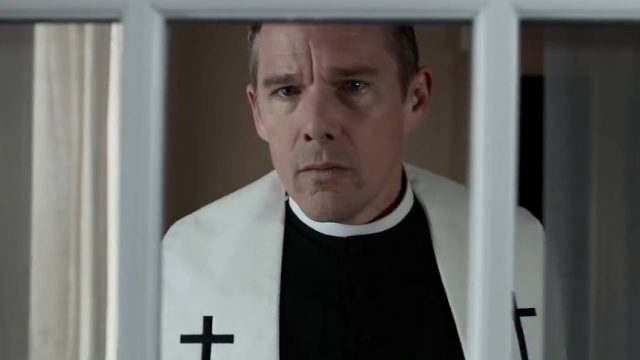Paul Schrader’s First Reformed feels like the movie the great director/writer/critic’s whole career has been leading up to. For more than forty years, Schrader has brought us story after story of damaged men seeking their place in the universe, religious faith being tested, and the role of violence in contemporary society.
First Reformed has all of that in spades but feels like no retread, no leftovers – it is, rather, a film of unusual, at times shocking, potency, striking the viewer at various angles: in their sympathy, in their fear, in their paranoias, in their desiring for love. This is a film that will put the viewer through the emotional wringer, but not out of cheap stunts, only deep loving consideration and perfectly considered craft.
Ethan Hawke plays Reverend Toller, a Protestant Calvinist minister living and preaching in a small but historically notable church in upstate New York. Slowly, the audience learns of his past – he was a military chaplain once, with a wife and a son; the son’s death in Iraq (spurred on by Toller’s encouragement to enlist) contributed to the end of Toller’s marriage. Now, he lives alone, usually filmed by Schrader in the darkness of his sparse, sterile church. The viewer practically shivers from the cold of the atmosphere that Schrader provides. Filmed in stark whites and deep blacks, the scenes in Hawke’s church and living quarters give off a sense of the kind of sharp morality that those of faith look for, but without any of the comfort or warmth they desire. All of this reflects Toller’s life — lonely, quiet, and full of anxieties.
One day, a parishioner, the symbolically-named-but-maybe-not-so Mary (Amanda Seyfried) approaches Toller with a personal problem. Michael (Philip Ettinger), her husband and the father of her unborn child, wants her to have an abortion, though she wants to keep the baby. Michael is a “radical” environmentalist overwhelmed with loathing and dread about man-made climate change. He feels, sincerely, that it would be unpardonable to bring a child into a world rapidly and unprecedently destroying itself with heat, storms, and devastation. Voice cracking with fear and sorrow, Michael asks Toller whether God can forgive humanity for what they’ve done to the earth. Toller’s answers are unconvincing for Michael – and for himself.
Without saying too much about the particular turns of the plot of First Reformed, suffice it to say that Toller’s ability or inability to answer that question forms the basis for the film’s moral dilemma.
All of this might end up feeling overblown, like a comically endless series of sorrows and pities, if not anchored by Ethan Hawke’s deeply human, perhaps career best performance. Hawke gives Toller not just soul-searching introspection but also pettiness, humor, pride. He is no plaster saint, but rather the thing every saint and martyr begins their life as — a flesh and blood human, of great capacity for wisdom, grace, and good, but also beset by the frailties of the body and the weakness of the will.
Among crises of faith, the loss of faith is one that may be excessively depicted in film — more elusive, but captured here with intelligence and sensitivity and righteous anger at the destruction of our world, is another kind of crisis of faith: how one can do good when the burdens are faith are so great.
“No,” Toller remarks in voiceover, as he arranges the letters on First Reformed’s sign to read “Will God forgive us?.” “I have NOT lost my faith.” The most beautiful and most difficult thing about First Reformed is that he’s right – he has not.
Whether or not Paul Schrader still has faith I do not know. I only know that he has made a film about the struggles of faith that is complex in its thoughtfulness, brilliant in its craft, and above all, deeply human.

